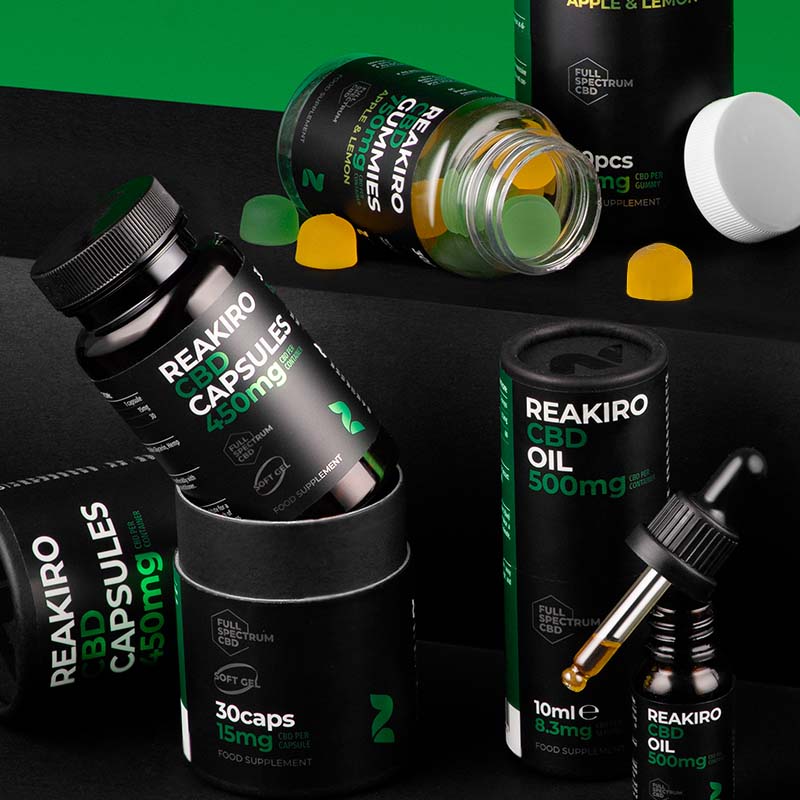Table of Contents
Introduction: CBD and ADHD
Causing people to be inattentive, hyperactive and impulsive Attention-Deficit/Hyperactivity Disorder affects both children and adults and how they function and develop, as well as their academic, occupational and social lives.
The condition continues to gain a lot of public attention, partly because several high-profile people share their experiences of ADHD. Celebrities like Denise Welch, Adam Levine (frontman of Maroon 5), singer Lily Allen, professional golfer Bubba Watson, Formula 1 champion Lewis Hamilton, and filmmaker Greta Gerwig have all spoken about their symptoms and struggles with ADHD. Their testimonies reduce stigma and increase awareness, showing that Attention-Deficit/Hyperactivity Disorder can affect people from all walks of life.
This increased visibility has also sparked a growing interest in exploring alternative treatments for ADHD, such as cannabidiol (CBD). Traditional pharmacological treatments, like stimulant medications, often come with a range of side effects, driving the search for new, more natural therapeutic options. In this article, we aim to evaluate the current scientific evidence regarding the efficacy, safety, and mechanisms of cannabis (CBD) as a potential treatment for ADHD and try to answer the question: Does CBD help with ADHD?
Debunking Common Myths About ADHD
Despite growing awareness of ADHD, many myths and misconceptions persist, leading to stigma and misunderstanding. This paragraph will address and debunk some common myths about ADHD. By clarifying these myths, we hope to foster a more accurate and compassionate understanding of ADHD.
"Back in my day, ADHD just wasn't a thing."
Contrary to what many people think, ADHD has existed throughout history, although it was often described differently. It's been known for centuries that people with ADHD behave in certain ways. Many historical figures are thought to have had ADHD traits. The first time ADHD was officially diagnosed was in 1775. Over time, we’ve learned more and more about the condition, just like we have about many other medical conditions.
"You can't have ADHD because you have a job, a master's degree, work in a hospital, have children, or have a partner."
Many people with ADHD go on to achieve great things despite the challenges they face. Famous people with ADHD, like the ones we mentioned before, show that success is possible. We should judge achievements against the person's true potential and the emotional and practical struggles they face. People with ADHD often say that achieving their goals is really hard for them and that they have to simplify their lives to manage their condition effectively. Having ADHD doesn’t mean you can’t be successful or hold responsible positions.
Some people say it's just a TikTok craze, while others believe it's causing ADHD. Some even say it's just a fashion and that it's a social contagion.
Social media platforms like TikTok have really helped to raise awareness of neurodiversity, including ADHD. People aren't actually catching ADHD from social media. They're just learning about it and recognising the symptoms in themselves. Some media outlets are happy to see social media helping to spread medical understanding, but others are less convinced. This is particularly true when it comes to ADHD. This just adds to the stigma that already surrounds the condition. Looking at social media trends, like the hashtags #ADHD and #Autism, shows that there’s been a similar increase in awareness, but there’s no suggestion that social media causes these conditions. While social media can be a mix of valuable and misleading information, it has overall had a positive impact on ADHD conversation and awareness.
"You can't have ADHD because it would affect your employment opportunities."
Having a formal ADHD diagnosis doesn't change whether someone has the condition. It just means they understand it better and can get extra support if they want it. It's up to you whether you tell your employer you have ADHD. It's your medical information, and you can decide what to share. ADHD is recognised as a disability under UK law, which means it's protected against employment discrimination. It's up to the individual to decide whether or not to declare ADHD during the recruitment or employment process.
"Treatment doesn't help; it just pacifies people."
This is a common misconception. ADHD meds don't just calm people down; they help them get better control of their cognitive functions. Unlike sedative meds, ADHD treatments help people focus and regulate their emotions so they can manage and improve their overall quality of life.
Can CBD Help with ADHD? What the Research Says
As we learn more about Attention-Deficit/Hyperactivity Disorder (ADHD), we’re also looking at different ways to treat it. The NICE reckons that ADHD affects about 5% of kids globally, with about 3% to 4% of adults in the UK affected. What’s more, according to a 2021 study, between 35% and 78% of children diagnosed with ADHD still experience symptoms into adulthood. Common treatments for ADHD are stimulant medications, but they can have side effects that can be tough to manage. As a result, there’s growing interest in alternative therapies, including the use of cannabidiol (CBD). In this paragraph, we'll look at the latest CBD ADHD research. We'll examine is CBD good for ADHD, how it works, how effective it is, and whether it's safe based on preclinical and clinical studies. This analysis aims to give you a full picture of how CBD oil for ADHD could help with ADHD symptoms.
A 2020 study looked at the existing evidence from published literature about the effectiveness of cannabinoid products in controlling ADHD symptoms and their common co-morbidities. The results showed that CBD can improve ADHD symptoms in adults over six weeks without affecting their cognitive function. Studies of CBD-based medicines suggest improvements in ADHD symptoms and many other mental, social, communication, behavioural, and motor disorders in adults when used as an adjunct to other treatments.
However, there is not enough research on children and young people (CYP) to know if CBD is helpful for ADHD and other problems. There is not enough evidence to say that CBD products are suitable for ADHD. While short-term studies have found that CBD can help with ADHD and other mental health problems, long-term use might have a negative effect on cognitive function, education and employment.
Another report looks at how cannabis can help people with ADHD. In this report, they describe three patients with ADHD who used CBD and THC and saw improvements in their symptoms and quality of life. All three patients reported better emotional control, and two got and did well at more demanding jobs. Objective measures supported these improvements, with all three patients showing improvements on mental health rating scales.The patients used cannabis with other drugs, such as stimulants, antidepressants, or mood stabilisers. One patient said cannabis helped him a lot. Another stopped taking stimulant medication, thanks to cannabis and lithium. Even though the cannabis was not in the blood, the patients felt the effects all day, which shows that other drugs are important for long-term success.
The patients talked to their psychiatrist about using cannabis and were given oral cannabidiol oil (CBD 20:1) from a medical source. However, the patients said they used it inconsistently and liked different products. Two patients used cannabis once a day, while the third used it twice a day. Two patients preferred smoking cannabis. The patients had different preferences for chemical composition. One used a high-THC, low-CBD product, while the other used CBD doses 20:1 with high THC and no CBD. This raises questions about the product's content. One of the main drawbacks of case studies is that they can't be used to make generalisations because of the small number of patients.
Exploring CBD Forms for ADHD: A Cautious Approach
When using CBD to manage ADHD symptoms, it's important to proceed with caution and the medical practitioner’s approval. Adding this new supplement to your routine might have varying effects. However, if you are interested in trying CBD for ADHD, it is helpful to understand the various forms available. Our comparison table gives you a quick overview of the most common forms of CBD – capsules, oil, spray, gummies and topicals so you can make an informed decision.
|
Form of CBD |
Preparation |
Advantages |
Disadvantages |
|
To be placed under the tongue for 60 - 90 seconds before swallowing |
Fast absorption, customisable dosage |
The taste might be unpleasant for some |
|
|
Swallowed with water |
Easy to dose, discreet, long-lasting effects, no taste |
Slower onset of effects compared to oils |
|
|
Sprayed under the tongue or inside the cheek |
Convenient, fast absorption, easy to use, nice flavours |
It can be difficult to dose accurately |
|
|
Chewed and swallowed |
Tasty, easy to dose, discreet |
It might contain added sugars, a slower onset of effects |
|
|
Applied directly to the skin |
Targeted relief, non-invasive |
Effects are localised, not systemic |
When considering CBD for ADHD, it's important to think about possible side effects. While CBD is said to be a safe and well-tolerated substance, some users may experience drowsiness, dry mouth, or gastrointestinal discomfort. It's important to be extra careful with certain groups, like the elderly or pregnant women, who might be more sensitive to these effects. It's also worth noting that allergic reactions to CBD products are possible, ranging from skin rashes to respiratory issues. It's always a good idea to check with your doctor before trying CBD, especially if you're in a vulnerable group.
Conclusion
From the research mentioned in this article, CBD can be considered a possible option for treating ADHD. Studies have shown that CBD, when used with traditional medications, might help to improve ADHD symptoms and overall quality of life. However, while case studies have shown positive results, more randomised controlled trials are needed to understand the efficacy and safety. If you're thinking of trying CBD as part of your treatment, consultation with a healthcare professional is strongly advised.
References
- Attention deficit hyperactivity disorder (ADHD) NHS programme update
- ADHD UK
- Economic burden of attention-deficit/hyperactivity disorder among adults in the United States: a societal perspective
- Ayyash HF, Ogundele M, Cartas BC, et alG632 Effectiveness of Cannabidiol oil in the management of ADHD and its co-morbidities: Review of the evidenceArchives of Disease in Childhood 2020;105:A228.
- Cannabis for the Treatment of Attention Deficit Hyperactivity Disorder: A Report of 3 Cases
- CANNABIDIOL (CBD) Critical Review Report



